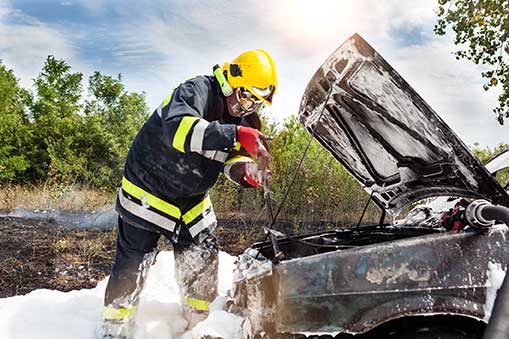Case Types
Learn about the case types we handle and submit your case for a free, private, and no-obligation review for justice potential and compensation value.

The Camp Lejeune Water Contamination Issue: Eligibility & Diagnoses
The Camp Lejeune water contamination issue has had significant health ramifications for individuals who served at Marine Corps Base Camp Lejeune or Marine Corps Air Station (MCAS) New River, North Carolina, between August 1, 1953, and December 31, 1987.
If you fall into this category, you may be eligible for disability and health care benefits the Department of Veterans Affairs (VA) provides.
In this article, we will delve into the eligibility criteria for these benefits and guide you on how to apply.
Am I eligible for VA disability compensation?
If you meet specific criteria, you may be eligible for disability compensation payments from the VA on a presumptive basis.
This eligibility applies to Veterans, Reservists, and National Guard members.
To qualify, the following conditions must be met:
- You served at Camp Lejeune or MCAS New River, North Carolina, for at least 30 days between August 1, 1953, and December 31, 1987.
- You did not receive a dishonorable discharge upon separating from the military.
Additionally, you must have a diagnosis of one or more of the following presumptive conditions:
- Adult leukemia
- Aplastic anemia and other myelodysplastic syndromes
- Bladder cancer
- Kidney cancer
- Liver cancer
- Multiple myeloma
- Non-Hodgkin’s lymphoma
- Parkinson’s disease
These presumptive conditions are strongly linked to exposure to chemicals in the drinking water at Camp Lejeune and MCAS New River during the specified period.
What does it mean to have a presumptive condition?
In the context of VA disability claims, having a presumptive condition means that it is automatically assumed or presumed that your military service caused your illness.
For many health conditions, you would typically need to provide evidence demonstrating a direct link between your service and the condition.
However, in the case of presumptive conditions, this requirement is waived, and you only need to meet the service requirements outlined for the presumption.
Presumptive conditions are established by laws or regulations, making it easier for eligible individuals to receive compensation without the burden of proving causation.
How do I file a claim for disability compensation?
Filing a claim for disability compensation can be done online, by mail, in person, or with the assistance of a trained professional.
When initiating your claim, you must specify that you are applying for one or more of the presumptive conditions associated with Camp Lejeune.
Supporting documents you will need to provide with your claim include:
- Military records demonstrating your service at Camp Lejeune or MCAS New River for at least 30 days between August 1, 1953, and December 31, 1987.
- Medical records confirm your diagnosis of one or more of the eight Camp Lejeune presumptive conditions.
The VA has streamlined the claims process, offering online filing options to simplify the application process for eligible individuals.
Can I also get health care benefits?
Yes, if you meet the service requirements for Camp Lejeune, you may be eligible to enroll in VA health care.
Furthermore, if you have any of the 15 covered health conditions related to Camp Lejeune, you will not have to pay a copay for care associated with those conditions.
To apply for VA health care benefits, you can follow the appropriate procedures outlined by the VA.
Knowing the covered health conditions is essential to determine if you are eligible for copay-free care.
The 15 covered conditions related to Camp Lejeune are as follows:
- Bladder cancer
- Breast cancer
- Esophageal cancer
- Female infertility
- Hepatic steatosis
- Kidney cancer
- Leukemia
- Lung cancer
- Miscarriage
- Multiple myeloma
- Myelodysplastic syndromes
- Neurobehavioral effects
- Non-Hodgkin’s lymphoma
- Renal toxicity
- Scleroderma
It's worth noting that if you receive VA health care for other conditions not on this list, you may still be subject to copay requirements for that care.
In conclusion, the Camp Lejeune water contamination has had far-reaching health consequences for those who served at the affected locations during the specified period.
The VA's Camp Lejeune benefits program aims to provide eligible individuals with disability compensation and health care benefits, particularly for presumptive conditions associated with exposure to contaminated water.
Understanding the eligibility criteria and how to file claims is crucial for affected individuals to access the support and care they need.
We believe that all Camp Lejeune water contamination victims—and their families—deserve justice and compensation, starting with a free, private case evaluation.

Arizona School Abuse Cases: Statistics Show Serious Issues
In 2022, Arizona witnessed a troubling rise in misconduct cases involving educators, with approximately 75 teachers surrendering their teaching certificates due to various forms of misconduct, ranging from alcohol consumption in the classroom to improper interactions with students.
These incidents are a grim reminder of the importance of maintaining the integrity of the education system and protecting the well-being of students.
The Arizona State Board of Education, responsible for addressing such cases and imposing disciplinary actions on educators found guilty of unprofessional or immoral conduct, released its "2022 Enforcement Action Report."
This report highlighted the alarming increase in surrenders, marking the highest number since 2012.
The board is currently facing a substantial workload, with:
- a projected 264% increase in cases compared to 2012;
- a plan to adjudicate around 200 cases this year alone;
- the urgency of addressing misconduct within the education sector.
Examining the gender breakdown of the cases, the report reveals that over the past decade:
- 61% of enforcement actions involved male educators;
- 39% involving female educators; but,
- Evidence that shows misconduct is not exclusive to a particular gender.
The report categorizes the cases by the type of certificates held by the educator:
- 27% of enforcement actions were taken against secondary teachers;
- 19% involved elementary school teachers;
- 18% related to substitute teachers;
- Administrators accounted for 6% of the cases;
- Those with emergency teaching certificates represented 2%; and,
- Non-certificated educators in physical education, JROTC, and adult education comprised 3% of the cases.
In 2022, the disciplinary actions against:
- Secondary teachers were at 18%;
- Elementary school teachers at 17%;
- Substitute teachers at 17%;
- Educators with administrative certificates faced an increased enforcement rate at 9%; while,
- Non-certificated educators made up 5% of the cases adjudicated.
The nature of the misconduct cases varied, with:
- Sexual misconduct constitutes 37% of all cases;
- Substance abuse accounted for 22% of the cases;
- Assault made up 21%; and,
- Breach of contract represented 9% of the cases.
The sources of misconduct reports were diverse, with:
- 43%, coming from school officials;
- The Department of Public Safety followed closely at 34%; while,
- 13% of cases were reported by parents, discovered through Google alerts, or surfaced through traditional media sources.
The steps that Arizona schools are taking for hiring a qualified and trustworthy teaching staff.
School personnel are obligated to report misconduct to the board's Investigative Unit, and members of the public can also submit complaints through the board's website.
However, the board's jurisdiction is limited to educators employed in Arizona's district or charter schools.
This means that if a teacher commits a violation while working at a private school in the state, the board cannot prevent them from legally obtaining another teaching position in Arizona.
The board shares a list of disciplined educators with schools after each meeting to enhance student safety.
Moreover, schools hiring certified or non-certified educators must check the Arizona Department of Education's public and internal systems for any discipline records or ongoing investigations for immoral or unprofessional conduct.
Furthermore, these districts ensure their candidates possess a valid IVP Fingerprint Clearance Card and pass mandatory background checks.
Their comprehensive hiring procedures encompass the following:
- Formal interviews;
- Thorough reference and background checks;
- Certification verification; and,
- Candidate recommendations.
While the Arizona State Board of Education plays a crucial role in addressing and disciplining educators found guilty of unprofessional or immoral conduct, the rise in misconduct cases among educators in Arizona in 2022 raises concerns about the integrity of the education system and the safety of students.
We believe that all Arizona school abuse victims and their families deserve justice and compensation, starting with a free, private case evaluation.

Toxic Firefighting Foam Chemicals Persists in U.S. Despite Calls for a Ban
The evidence continues to mount that a widely used firefighting foam may be linked to high cancer rates among U.S. firefighters.
There is an alarming cancer risk among firefighters due to using firefighting foam containing toxic chemicals known as PFAS (per- and poly-fluoroalkyl substances).
Ben Brickhouse, a firefighter in Asheville, North Carolina, was forced into early retirement due to prostate cancer that had spread to his lymph nodes.
Ben Brickhouse, who became a firefighter later in life, initially anticipated a long career.
However, a routine physical in 2020 revealed an elevated prostate-specific antigen (PSA) level, a potential indicator of prostate cancer.
Subsequent tests confirmed the diagnosis, leading to the removal of his prostate.
Initially expecting a brief recovery period, Brickhouse's PSA levels did not return to normal, and further scans revealed that the cancer had spread, ending his firefighting career.
Only after his medical retirement and a lawsuit against the City of Asheville for workers' compensation benefits did Brickhouse learn about the link between cancer among firefighters and the use of Aqueous Film-Forming Foam (AFFF), which contains PFAS chemicals.
Brickhouse frequently used the foam as a firefighter during training, drills, and testing equipment.
The foam's leakage from fire trucks and the necessity to clean it up raised concerns about exposure.
The prevalence of cancer among firefighters and the widespread use of AFFF foam with PFAS chemicals are part of more significant national concerns.
Research indicates that high levels of PFAS chemicals may lead to various cancers and suppress the immune system.
Notably, PFAS-containing foam and gear used by firefighters have been identified as sources of exposure.
Despite these risks, many fire departments continue to use the foam, contributing to cancer becoming the leading cause of firefighter deaths, as the International Association of Fire Fighters reported.
The history of AFFF foam's introduction into firefighting begins with its development by 3M© in collaboration with the U.S. Navy to suppress fires:
- AFFF proved highly effective in extinguishing fuel fires and preventing reignition;
- Its success led to its widespread adoption by the military, commercial airports, and firefighting operations worldwide;
- However, early indications of the potential toxicity of PFAS chemicals associated with AFFF emerged as far back as the 1950s.
- Despite this knowledge, public disclosure of these risks was delayed by 3M© for decades.
Studies in the 1980s revealed health problems linked to PFAS exposure, including kidney and liver issues.
The use of AFFF foam in firefighting and its associated health risks became more apparent over time, especially as it pertained to cancer.
A landmark study in 2013 indicated that firefighters had a higher risk of cancer than the general population.
Subsequent research found associations between firefighting and various cancers, leading to cancer being classified as "carcinogenic to humans" by the World Health Organization.
While some progress has been made, including phasing out PFAS chemicals from military firefighting foams and calls for airports to switch to PFAS-free alternatives, the chemical industry has exerted significant influence in resisting stricter regulations.
Despite the evidence, chemical companies argue that safe alternatives do not exist.
Some states have implemented bans or limitations on AFFF foam use, but the challenge remains in disposing of existing stockpiles safely.
One concerning aspect is the shelf life of AFFF foam, which can exceed 30 years, making many fire departments reluctant to dispose of it.
Additionally, the foam's composition makes it difficult to destroy without environmental risks.
Solutions such as the "PFAS Annihilator," which converts PFAS chemicals into safer compounds, offer potential alternatives.
Changing the culture within firehouses has also proven challenging:
- Firefighters have often downplayed the risks, with some even removing breathing apparatus prematurely after extinguishing fires;
- The tradition of keeping soiled and potentially toxic turnout gear and wearing it for extended periods has posed additional health risks;
- Challenges persist in transitioning to safer practices, such as more frequent cleaning and two gear sets per firefighter.
Ben Brickhouse and others affected by cancer within the firefighting community advocate for increased awareness, cancer screenings, and eliminating PFAS chemicals from all firefighting equipment and foam.
The urgency of these measures is underscored by the debilitating impact of cancer on firefighters' lives and the need to protect current and future generations of firefighters from this occupational hazard.
We believe that victims of cancer from toxic firefighting foam—and their families—deserve justice and compensation, starting with a free, private case
Please seek the advice of a medical professional before making health care decisions. This advertisement is not associated with any government agency.
www.LevinsonLegalGroup.com is the property of Levinson Legal Group . Licensed to Practice in Arizona, California and Texas. Levinson Legal Group, PC, 4645 E Cotton Center Boulevard, Suite 200 Phoenix AZ 85040 United States
This website is not part of the Facebook website or Facebook, Inc. Additionally, this site is NOT endorsed by Facebook in any way. FACEBOOK is a trademark of FACEBOOK, INC.
ATTORNEY ADVERTISING. This Website is not intended to provide medical advice. Consult your doctor or physician before starting or stopping any medication.
Discontinuing a prescribed medication without your doctor’s advice can result in injury or death. are not an indication of future results. Every case is evaluated on its own facts and circumstances. Valuation depends on facts, injuries, jurisdiction, venue, witnesses, parties, and testimony, among other factors. No representation is made that the quality of legal services to be performed is greater than the quality of legal services performed by other lawyers. Cases may be referred to third party attorneys and law firms. Do not rely on this advertisement in making any medical decision. Please call your physician before making any medical decision, including altering your use of any drug. Court costs and case expenses may be the responsibility of the client. Not available in all states. This advertisement is not intended as a testimonial, endorsement or dramatization, and does not constitute a guarantee, warranty, or prediction regarding the outcome of your legal matter, either expressed or implied. Anyone considering a lawyer should independently investigate the lawyers' credentials and ability, and not rely upon advertisements or self-proclaimed expertise. Only persons age 18 or older have permission to access our Service. Our Service does not address anyone under the age of 13 (Children)
Privacy Policy | Terms and Conditions | CCPA Privacy Notice | Do Not Sell My Info
